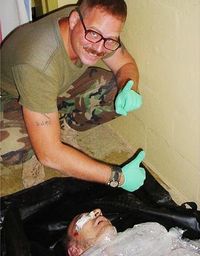Ask and ye shall receive
 Back in June, The Supreme Court delivered a decision in the Hamdan v. Rumsfeld case that many legal scholars were raving about. Military tribunals for detainees had been "struck down" it was claimed and seriously minded folks, especially Glenn Greenwald (for whom I have the utmost respect) prognosticated a number of serious problems for the Bush administration subsequent to this opinion. But lurking in the background was one helpful piece of advice offered by Justice Stephen Breyer. Helpful to the White House, that is, if it decided to pursue a continuation of the travesty of justice.
Back in June, The Supreme Court delivered a decision in the Hamdan v. Rumsfeld case that many legal scholars were raving about. Military tribunals for detainees had been "struck down" it was claimed and seriously minded folks, especially Glenn Greenwald (for whom I have the utmost respect) prognosticated a number of serious problems for the Bush administration subsequent to this opinion. But lurking in the background was one helpful piece of advice offered by Justice Stephen Breyer. Helpful to the White House, that is, if it decided to pursue a continuation of the travesty of justice.Nothing prevents the President from returning to Congress to seek the authority he belives necessary.It should have been obvious, of course, that this is exactly what would happen. Indeed, I said so back then and proferred that the decision would likely not be as detrimental to the administration as many, including Greenwald, had imagined.
Bush will do this and the wheedling Congress will grant all that is asked. And, as we well know, there are no limits to the authority Bush thinks he needs.No one seemed to want to believe me. I continued to state it this position in the simplest of terms:
Don't expect this decision to change much of anything on the ground in Gitmo.
I have expressed doubts that the decision would do much of anything, since Congress, at the behest of the White House, appear ready to leap into the now extant legal void and concoct some legislative legerdemain that would retroactively legalize everything Bush has already done. And Congress will do this upon advice received from the Supreme Court itself on how best to legalise the conduct the Supremes were calling illegal on that day.Indeed, the so-called compromise (how laugable that sounds) went a few steps further than merely granting a continuance of the tribunals.
Mr. Bush, as he made clear yesterday, intends to continue using the CIA to secretly detain and abuse certain terrorist suspects. He will do so by issuing his own interpretation of the Geneva Conventions in an executive order and by relying on questionable Justice Department opinions that authorize such practices as exposing prisoners to hypothermia and prolonged sleep deprivation. Under the compromise agreed to yesterday, Congress would recognize his authority to take these steps and prevent prisoners from appealing them to U.S. courts. The bill would also immunize CIA personnel from prosecution for all but the most serious abuses and protect those who in the past violated U.S. law against war crimes.My prediction was almost a little too good.
In effect, the agreement means that U.S. violations of international human rights law can continue as long as Mr. Bush is president, with Congress's tacit assent.
Now, I notice that Greenwald is still on the attack over the pathetic postion adopted by Congress -- especially the distressing lack of participation by Democrats on this issue. And he is right to do so. But Greenwald's arguments immediately after the Hamdan opinion seemed to me to completely overlook what all of us have been witness to for years now: that this Congress is utterly craven when it comes to opposing Bush on issues of war and national security when the White House has clearly breached the law. How could anyone not expect this Republican-led Congress to do exactly what it now has done as regards detainee treatment? I know I did.
And now we have our very own state-sanctioned Lubyanka. Despite this expected, disgraceful repudiation of hundreds of years of legal standard, at this point I have only one question: why. Why are the supposed upright Americans who occupy the Congress of the United States so willing -- eager -- to sign away the tradition of forthright jurisprudence so clearly mandated by the Constitution and the laws of this land?
Bush will tell us it is because the people in Gitmo -- if they would even call them people -- are the "worst of the worst." Some, no doubt, are very bad. But there are also people like this:

It's hard to picture Haji Nasrat Khan as an international terrorist. For a start, the grey-bearded Afghan can barely walk, shuffling along on a three-wheeled walking frame. His sight is terrible - he squints through milky eyes that sometimes roll towards the heavens - while his helpers have to shout to make themselves heard. And as for his age - nobody knows for sure, not even Nasrat himself. "I think I am 78, or maybe 79," he ventures uncertainly, pausing over a cup of green tea.And this is why we have a system of jurisprudence. Or at least, we used to.
Yet for three and a half years the US government deemed this elderly, infirm man an "enemy combatant", so dangerous to America's security that he was imprisoned at Guantánamo Bay.


0 Comments:
Post a Comment
<< Home